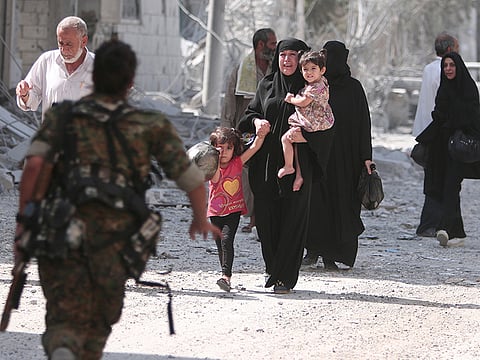Saudi cleric Al Mohaisni commands Aleppo rebels
He rose to prominence after launching a recruitment campaign to fight Syrian regime

Beirut: The man behind the recent rebel advances in the Syrian north, which took both government troops and Moscow completely by surprise, is a controversial Saudi cleric named Abdullah Al Mohaisni, who came to Syria to join the fight alongside jihadi rebels in 2013.
The fact that he is non-Syrian is upsetting for many seculars in the Syrian Opposition, and so are his links to Al Qaida. Given his impressive powerbase within the Syrian rebel community, many have started supporting him regardless, seeing him as an inspiring Salafist leader, much needed in the battlefield.
Originally from the Al Qassim region of Saudi Arabia, in the heart of the Arabian Peninsula, Al Mohaisni completed his PhD in Islamic Jurisprudence at the Imam Mohammad Bin Saud Islamic University in Riyadh, with a dissertation about Prisoners of War in Islam. He was a student of Sulaiman Al Alwan, a key Saudi ideologue in Al Qaida who had mentored one of the 9/11 hijackers. Al Mohaisni has defended and spoken fondly of Al Qaida’s Egyptian emir, Ayman Al Zawahiri, and of the terror groups’ founder, Osama Bin Laden.
Abdullah Al Mohaisni rose to fame in mid-2015, launching a recruiting campaign among Syrians called, “Take Up Arms, Don’t Stand Still.” He also runs the Jihad’s Callers Centre, popularising the call “Jahed Bi Malak” (Wage Jihad With Your Money).
When preparing to overrun Idlib in northwestern Syria, Al Mohaisni called for $5 million (Dh18.37 million) for his men, and claimed to have secured it from his network in the global jihadi community.
An inflammatory speaker who lashes out against the Syrian regime, Hezbollah, and Vladimir Putin, Al Mohaisni won the minds of many, becoming an overnight rebel icon in the Syrian north. His online videos were shot with HD cameras, are well choreographed, and include English subtitles. He currently stands as a ranking battlefield commander, no different from Abu Mohammad Al Golani, Abu Omar Al Shishani, and the self-proclaimed emir of Daesh, Abu Bakr Al Baghdadi.
In addition to his battlefield duties, he still serves as Grand Judge of Jaish Al Fatah, the military group that ran the city of Idlib in mid-2015.
It was and remains strongly allied with Jabhat Al Nusra, the Al Qaida branch in Syria that recently renamed itself “Jabhet Fatah Al Sham” and parted ways — on paper — from Osama Bin Laden’s mother organisation. He also played a crucial role in the overrunning of Jisr Al Shughour, a city in the Idlib governorate, in 2015.



